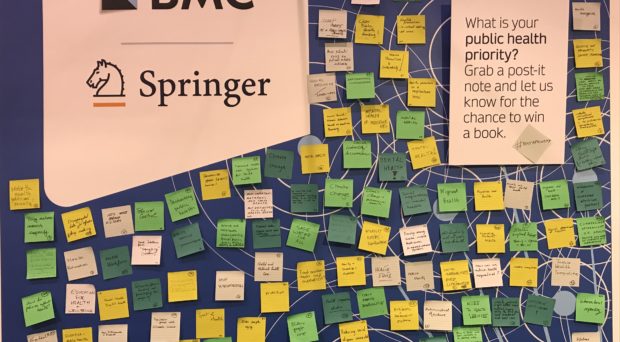
One of the most exciting aspects of public health is the diversity of the topics covered by the field. Public health plays a part in almost all of the 17 Sustainable Development Goals and draws individuals from a wide range of backgrounds, but with limited resources and such large challenges it can be difficult to know where to begin.
We asked the public health delegates at two conferences last November, the American Public Health Association (APHA) conference in the USA and the European Public Health conference (EPHC) in France, to tell us their public health priorities. In this blog I’ve broken down a few of the top topics as determined by the experts.
Health equity
Health Equity was considered by far the biggest public health priority for both European and American delegates. 24% of responses given at APHA and 20% of responses given at EPHC were related to health equity and covered a broad range of subtopics such as maternal health, migrant health, and geographical differences in healthcare access.
Answers from the delegates at EPHC tended to have a larger focus on health equity among migrants and refugees, whereas delegates at APHA focused more on health equity as a whole. This difference is probably influenced by the large number of refugees across Europe and the difference in health care access between the two continents.
Health equity was also considered an important global challenge during the creation of the SDGs. Not only does it feature in Goal 10 ‘Reduced Inequality’ but it is also considered an important aspect of several other SDG goals.
Mental health
Another key topic that featured heavily at both conferences was mental health and suicide prevention. 11% of the European delegates and 6% of delegates in America chose mental health issues as their public health priority.
According to the WHO, mental health issues are the leading cause of ill-health and disability; however, the misunderstanding and stigma around mental illness is still widespread. More research and a greater spotlight on issues in mental health could help to tackle some of these problems.
 Climate change and Environmental health,
Climate change and Environmental health,
With the recent flooding across Europe, wild fires in Australia and climate protests across the world it is perhaps unsurprising that Goal 13 “Climate action” was also considered a key public health priority. 7% of respondents from EPHC and 4% of respondents from APHA mentioned climate change as their public health priority.
Whilst there have been some moves towards tackling climate change, such as the 2016 Paris agreement, this public health priority is often overlooked by policy makers as it can be hard to identify solutions to the problem without limiting economic growth. However, with the recent media coverage around climate change it is likely that this public health priority will become even more prominent in the future.
Violence prevention
One of the biggest differences between the two conferences was the topic of violence prevention. 8% of responses from the US conference delegates focused on violence prevention as a key public health priority, whereas this response was not given by any of the European conference delegates.
Whilst violence prevention remains a global issue, many of these responses tended to focus around gun violence and sensible firearms policy, which affects countries on varying levels. For example, half of all gun-related deaths in 2016 occurred within only six countries, Brazil, the United States, Mexico, Venezuela, Colombia and Guatemala.
This issue is starting to be addressed across the US, both in the media and by US lawmakers who have recently reached an agreement to fund gun-violence research for the first time in 20 years.
Vaccines
Vaccine hesitancy (also known as anti-vax) has become a growing issue with an increased number of disease outbreaks occurring across the world as a result of poor vaccination coverage. This public health problem was chosen by over 4% of the European conference and 0% of US conference delegates.
Vaccine hesitancy has seen a lot of attention in recent years with the WHO establishing an expert group ‘Measuring Behavioural and Social Drivers of Vaccination’ to address the reasons for under-vaccination.
Other priorities
Whilst these were the priorities that were mentioned most frequently, we received answers covering a whole range of topics from anti-microbial resistance to universal education and genetics in public health. Check out #postapriority for some other examples of the answers given.
Comments